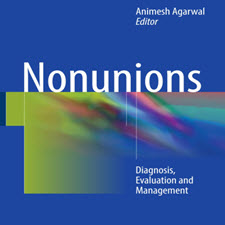بایگانی برچسب برای: evaluation

Nonunions Diagnosis, Evaluation and Management
اطلاع رسانیFracture healing is a very unique process in the human body. Bone is a unique tissue in that it can regenerate itself during the process of healing. This requires a very complex process which is regulated by various metabolic and hormonal factors to include various growth factors. These biological processes occur at the cellular level requiring recruitment proliferation and differentiation of many cells including endothelial cells, osteoprogenitor cells, platelets, macrophages, mesenchymal stem cells (MSCs) , and monocytes. These cells secrete various biologically active molecules at the site of injury to facilitate fracture repair. The bone morphogenetic proteins (BMPs) are osteoinductive agents which promote the proliferation and differentiation of undifferentiated cells to become either osteoprogenitor or chondroprogenitor cells. Although our bodies have the inherent capability to repair the fracture, the fracture healing process can be impaired for numerous reasons. When the fracture healing cascade stalls, a delayed union may develop, but the process may altogether cease. In a delayed union , both clinical evidence and radiographic evidence of healing do progress, but it lags behind what the normal healing time should be for a particular bone. There are however many factors to take into consideration such as the particular bone involved, the specific anatomic regions of the particular bone, the fracture pattern, as well as the method of treatment.
![Dysphagia.Evaluation.and.Treatment.From.the.Perspective.of.Rehabilitation.[taliem.ir]](https://taliem.ir/wp-content/uploads/Dysphagia.Evaluation.and_.Treatment.From_.the_.Perspective.of_.Rehabilitation.taliem.ir_.jpg)
Dysphagia Evaluation and Treatment
اطلاع رسانیThis chapter discusses common dysphagia terminology. A common understanding of important terms relevant to dysphagia enables healthcare professionals to communicate clearly and rapidly. The basic knowledge of anatomical structures associated with swallowing is fundamental to understanding the whole swallow process including the evaluation and treatment of dysphagia.
![Intervention.Effectiveness.Research.Quality.Improvement.[taliem.ir]](https://taliem.ir/wp-content/uploads/Intervention.Effectiveness.Research.Quality.Improvement.taliem.ir_.jpg)
Intervention Effectiveness Research: Quality Improvement and Program Evaluation
اطلاع رسانیThis book is intended to be a practical guide designed for those who are embarking on a journey of demonstrating care quality and outcomes the at the intersection of research and practice, alternatively described as intervention effectiveness research, quality improvement activities, and program evaluation. We acknowledge that in this space are dynamically interacting factors that affect all health outcomes at the individual, family, community, and system levels. These factors range from the genome to the political and include physical and mental characteristics as well as social processes within and external to the individual and the health system . Efforts to understand the effectiveness of interventions or programs in relationship to social and behavioral factors will beneft from taking a high-level look at problems in the broad context of population and setting, and taking into account the diversity of intervention factors known to be effcacious for the population . This perspective is conceptualized in the Problem-Intervention-Outcome Meta-Model (PIO MM) described in Chapter 2. Transcending the differences among various worldviews of research, quality improvement, and evaluation allows us to think more clearly about the fundamental concepts and realize our potential to study and act to improve population health.
![A-fuzzy-model-to-evaluate-the-suitability-of-installing-an-enterprise.[taliem.ir]](https://taliem.ir/wp-content/uploads/A-fuzzy-model-to-evaluate-the-suitability-of-installing-an-enterprise.taliem.ir_.jpg)
A fuzzy model to evaluate the suitability of installing an enterprise resource planning system
اطلاع رسانیThe use of enterprise resource planning (ERP) as a foundation for the integration of the complete range of business processes and functions, is clearly useful and economically profitable in most very large organizations which manage a great deal of data in their information systems. However, the decision of installing an ERP system in all the companies is not always so clear, it will depend on the size, future profits and other features of the company. Therefore, different parameters (features, aspects) will be evaluated to make a decision about the suitability of the ERP system. These parameters might have different nature or the knowledge about them could be vague or imprecise. Thus, this implies that it would be suitable that the evaluation process can manage heterogeneous information. In this paper we shall present a fuzzy evaluation model to evaluate the suitability of an ERP system based on a multi-expert decision-making (ME-DM) process that is able to deal with heterogeneous information.
![Health information systems Failure, success[taliem.ir]](https://taliem.ir/wp-content/uploads/Health-information-systems-Failure-successtaliem.ir_.jpg)
Health information systems: Failure, success and improvisation
اطلاع رسانیBackground and purpose: The generalised assumption of health information systems (HIS) success is questioned by a few commentators in the medical informatics field
![Evaluating management training[taliem.ir]](https://taliem.ir/wp-content/uploads/Evaluating-management-trainingtaliem.ir_.jpg)
Evaluating management training and development in a cross-cultural context A stakeholder approach
اطلاع رسانیPurpose – The purpose of this paper is to address the challenge in evaluating China’s overseas management training and development (MTD) in cross-cultural settings. It examines the evaluation practice of China’s overseas MTD interventions and explores a comprehensive approach to the MTD evaluation. Design/methodology/approach – This study collected both quantitative and qualitative data from 526 major stakeholders involved in China’s overseas MTD. A mix method approach is used to explore the perspectives of different stakeholders. Findings – The respondents from different stakeholder groups perceived purposes of evaluation and problems conducting evaluation differently. The perceived evaluation criteria and approaches by individual group were also focused differently. The current evaluation system was based on
segmented information collection and little joint effort was found in the MTD evaluation. The judgement on the value of China’s overseas MTD is culturally sensitive due to the diversity of stakeholders from different cultural backgrounds. A new framework is proposed to address the evaluation challenge. Research limitations/implications – This study is limited to evaluating China’s MTD between China and the UK. The valuation framework is based on complex involvement of multiple stakeholders in an international setting. It may not be applicable to situations where only two parties are involved in training. Practical implications – The proposed stakeholder-based evaluation framework may be used for other skill-based training and development programs involving multiple stakeholders in the international arena. Originality/value – This paper contributes to the HRM evaluation literature by focusing on a unique evaluation setting and proposes a framework to evaluate a complex international MTD initiative by the Chinese Government. Keywords China, United Kingdom, Stakeholder analysis, Cross cultural studies, Training evaluation, Management development Paper type Research paper


